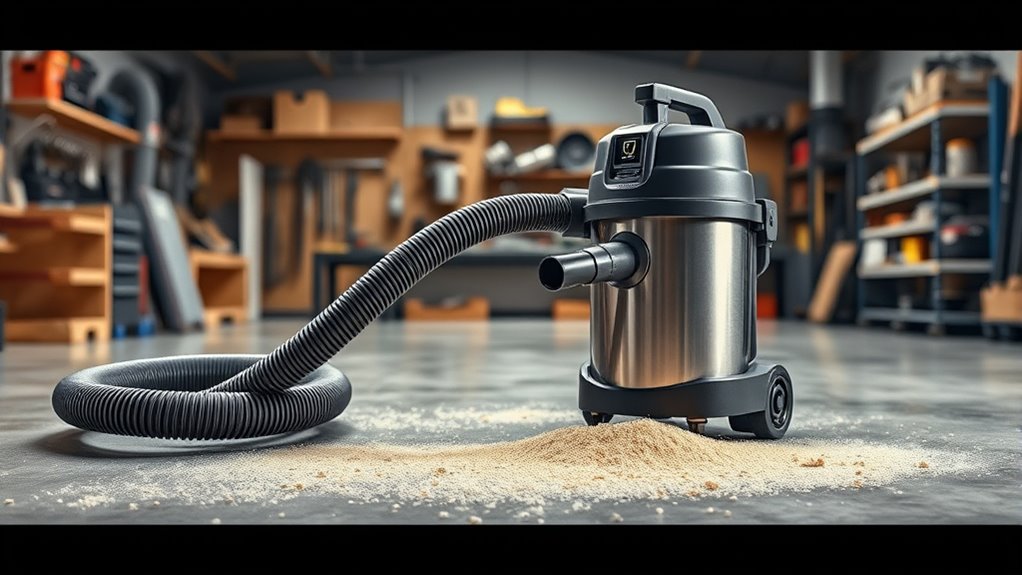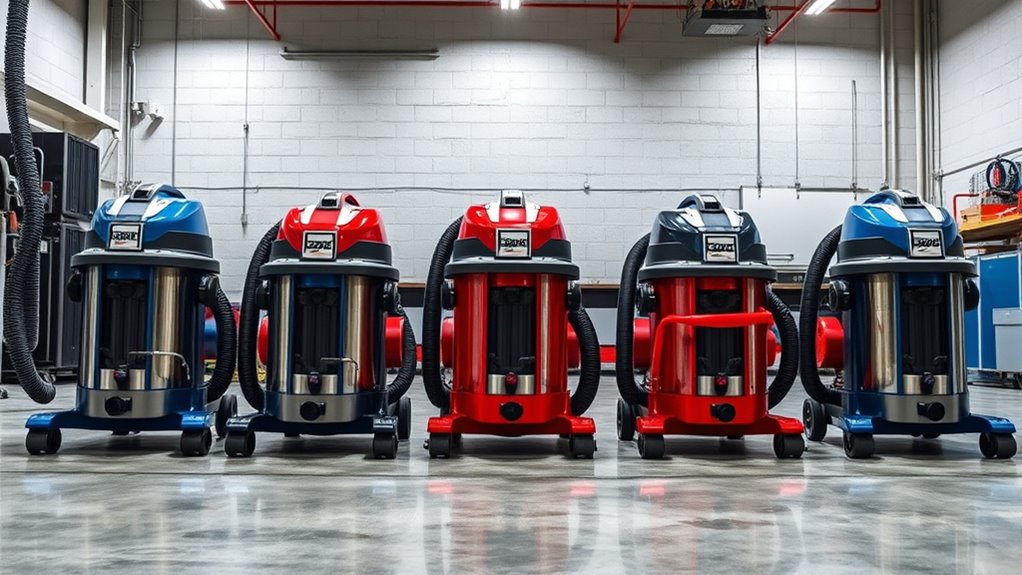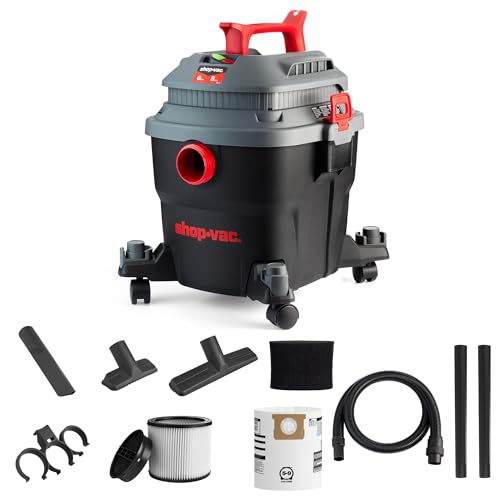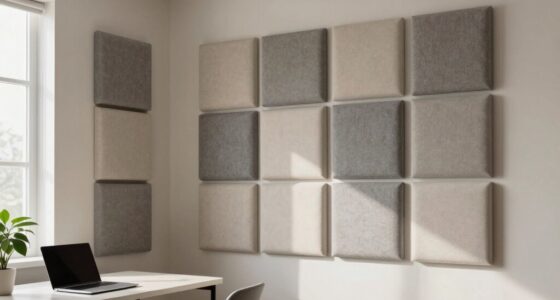If you’re looking for the best high-CFM shop vacuums in 2025, I recommend checking out models like the Fein Turbo II, Vacmaster 16-Gallon, Shop-Vac 6-Gallon, DEWALT Stealthsonic, and the DEWALT 6-Gallon. These provide powerful suction, large capacities, and quiet operation for demanding workshop tasks. Each offers a good balance of power, portability, and features. Keep going to discover detailed comparisons and tips to pick the perfect one for your workshop needs.
Key Takeaways
- Top models feature high suction power (4-6.5 Peak HP) with airflow from 110 to 151 CFM for efficient debris and dust removal.
- Varied capacities from 5-gallon to 16-gallon tanks suit different workshop sizes and continuous heavy-duty tasks.
- Noise levels range from quiet (65 dB) to louder options, with features like onboard storage and versatile accessories.
- Designed for DIY, professional, and industrial use, these vacuums handle wet/dry debris with compatible filters and durable construction.
- Higher airflow and power come with increased price but ensure reliable performance, durability, and efficient debris pickup.
Shop-Vac 6 Gallon Wet/Dry Vacuum
If you’re looking for a powerful and versatile shop vacuum that can handle both wet and dry messes, the Shop-Vac 6 Gallon Wet/Dry Vacuum is an excellent choice. Its 5.0 HP motor provides strong suction, with 110 CFM airflow that quickly tackles dust, debris, and liquid spills. Designed for durability and ease of use, it features a compact, cube-shaped body that prevents tipping and fits into tight spaces. The included 7-foot hose, extension wands, and filters make it adaptable for various tasks. Despite its quiet operation at around 96 dB, it delivers impressive cleaning power, making it ideal for workshops, garages, and job sites.
Best For: DIY enthusiasts, workshop professionals, and homeowners needing a reliable, portable wet/dry vacuum for cleaning up dust, debris, and liquid spills in tight spaces.
Pros:
- Powerful 5.0 HP motor with high suction and 110 CFM airflow for efficient cleaning
- Compact, cube-shaped design offers stability and easy storage in tight spaces
- Includes versatile accessories such as a 7-foot hose, extension wands, and filters for various tasks
Cons:
- Operating noise at around 96 dB may be loud for some users
- Some assembly required for handle and wheels, which could be inconvenient
- Storage organization features might be less optimal, with hooks and placement that could be improved
DEWALT 5 Gal Stealthsonic Shop Vacuum Wet and Dry
The DEWALT 5 Gal Stealthsonic Shop Vacuum Wet and Dry stands out for users who need a quiet yet powerful cleaning solution. It operates at less than 65dB, making it about 50% quieter than previous models, so you can work without disturbing others or risking hearing damage. Its 4 Peak Horsepower motor provides strong suction for dry dust, debris, and liquid spills, ensuring thorough cleaning. Weighing just 16.9 pounds, it’s lightweight and easy to maneuver, while the durable stainless steel tank offers ample capacity. With versatile nozzles, a long cord, and organized accessory storage, it’s ideal for workshops, garages, or even vehicle cleaning.
Best For: homeowners, workshop professionals, and vehicle enthusiasts seeking a quiet yet powerful wet and dry vacuum for versatile cleaning tasks.
Pros:
- Operates at less than 65dB, ensuring quiet operation suitable for indoor use
- Powerful 4 Peak Horsepower motor delivers strong suction for dry and liquid messes
- Compact, lightweight design with durable stainless steel tank and ample capacity
Cons:
- May be insufficient for extremely heavy-duty industrial cleaning needs
- Limited to a 5-gallon capacity, requiring emptying for larger jobs
- Slightly higher price point compared to basic models with fewer features
Fein Turbo II 8.5 Gallon Wet/Dry Dust Extractor
For anyone seeking a powerful yet quiet dust extractor, the Fein Turbo II 8.5 Gallon Wet/Dry Dust Extractor stands out with its 1,100-watt motor that delivers an impressive 151 CFM airflow and 98 PSI static water lift. It operates quietly at 66 dB(A), making it ideal for noise-sensitive environments. Its sturdy design includes a 13-foot hose, a long power cord, and convenient accessory storage, enhancing mobility. Users praise its strong suction, reliable performance, and ability to handle dust, debris, and liquids. While some note minor issues with the autostart feature and cord quality, overall, it’s a versatile and cost-effective choice for demanding workshops.
Best For: professionals and hobbyists seeking a powerful, quiet, and versatile dust extractor for woodworking, debris removal, and cleaning tasks in workshop environments.
Pros:
- Strong suction power with 151 CFM airflow and 98 PSI static water lift
- Operates quietly at 66 dB(A), ideal for noise-sensitive settings
- Includes a long hose and power cord for enhanced mobility and convenience
Cons:
- Autostart feature may fail over time, requiring repairs or replacement
- Cord quality can be stiff and difficult to store properly
- Limited effectiveness with woodworking dust compared to dedicated dust collectors
Vacmaster 16-Gallon 6.5 Peak HP† Wet/Dry Vacuum – VJH1612PF 1101, Red
With its powerful 6.5 peak HP motor and 16-gallon capacity, the Vacmaster VJH1612PF is an excellent choice for serious workshop users who need reliable, high-CFM suction. It delivers 145 CFM airflow, efficiently handling debris and wet materials. The vacuum features a padded push handle, wide-stance casters for easy maneuverability, and complete onboard storage for hose, cord, and accessories. It converts easily to a blower function, making cleanup versatile. With filters that extend lifespan and a large drain port for quick emptying, this red vacuum combines power, convenience, and durability for demanding workshop tasks.
Best For: serious workshop users and professionals who need a high-capacity, powerful wet/dry vacuum with reliable performance and versatile cleanup options.
Pros:
- Powerful 6.5 peak HP motor with 145 CFM airflow for efficient debris and wet material pickup
- Large 16-gallon capacity and durable filters extend lifespan and protect the motor
- Complete onboard storage and easy maneuverability with padded handle and wide-stance casters
Cons:
- Heavier weight due to large capacity may require more effort to move
- Bulkier size could be less convenient for small or tight spaces
- May be overkill for casual or light-duty cleaning tasks
DEWALT 6 Gallon Wet Dry Shop Vac
If you’re seeking a shop vacuum that balances powerful suction with quiet operation, the DEWALT 6 Gallon STEALTHSONIC Wet Dry Shop Vac stands out as an excellent choice. Equipped with a 5 Peak HP motor and a 6-gallon capacity, it handles wet and dry debris efficiently. Its Quiet Technology reduces noise by 50%, operating at just 65 dB, making it surprisingly silent for a shop vac. The included accessories, such as a washable filter, hoses, and extension wands, boost versatility. Portable and durable, it’s perfect for workshops, garages, and job sites, offering strong performance without sacrificing comfort or convenience.
Best For: homeowners, workshop enthusiasts, and professionals seeking a quiet, portable, and powerful wet/dry shop vacuum for versatile cleaning tasks.
Pros:
- Powerful 5 Peak HP motor with strong suction for wet and dry debris
- Quiet operation at just 65 dB thanks to Quiet Technology, enabling conversation during use
- Compact, lightweight design with durable wheels and accessories for easy portability and storage
Cons:
- Some users report missing screws for assembly or a slightly fragile filter cover
- Hose length could be longer for larger cleaning areas
- Lack of an output port for blower function limits versatility in some applications
Factors to Consider When Choosing High-Cfm Shop Vacuums for Workshops

When selecting a high-CFM shop vacuum, I focus on suction power and airflow capacity to make certain it handles my workshop tasks effectively. Size and portability also matter so I can move it easily around the space, while noise levels influence comfort during use. Finally, I check filter options to make sure they match my cleaning needs and maintenance preferences.
Suction Power Needs
Choosing the right high-CFM shop vacuum depends largely on its suction power, which directly impacts how effectively it can handle debris and dust. Higher CFM ratings mean greater airflow, allowing the vacuum to pick up large debris and fine dust quickly. For demanding workshop tasks, I recommend a shop vac with at least 110 CFM to guarantee it can handle heavy-duty cleaning consistently. Increased suction power from high CFM helps maintain performance when using longer hoses or multiple attachments. Pairing high CFM with a strong motor delivers maximum debris pickup, especially for large-volume or continuous jobs. However, it’s essential to balance high CFM with proper filters and dust collection systems to prevent motor overload and sustain suction efficiency over time.
Airflow Capacity Importance
Airflow capacity plays a crucial role in determining a shop vacuum’s overall cleaning performance, especially in demanding workshop environments. A high CFM means the vacuum can move large volumes of air quickly, improving debris and dust removal efficiency. This capability reduces clogging and allows the vacuum to handle fine dust, wet spills, and heavy debris at the same time. Generally, higher airflow capacity results in stronger suction power, making it better suited for tough cleaning tasks. Additionally, adequate airflow helps prevent motor overheating by ensuring continuous air circulation, which extends the vacuum’s lifespan. When choosing a high-CFM shop vacuum, it’s important to balance airflow with other factors like suction pressure and filtration. This balance ensures ideal performance tailored to your workshop’s specific needs.
Size and Portability
Size and portability considerably influence how effectively you can use a high-CFM shop vacuum in your workshop. Larger models with high airflow often take up more space, making storage and maneuverability challenging. Features like wheels, handles, and lightweight construction notably enhance portability, allowing you to move the vacuum easily across different areas. Compact models tend to be more portable and easier to store but might sacrifice some capacity or power, so finding the right balance is essential. Extended hoses and longer cords also boost mobility, letting you clean larger workshop sections without constant repositioning. Heavy-duty vacuums designed for portability usually include durable casters and ergonomic handles, ensuring they withstand frequent movement. Overall, choosing the right size and portability features depends on your workspace layout and cleaning needs.
Noise Level Considerations
When evaluating high-CFM shop vacuums, noise level becomes an important factor to contemplate, especially for indoor workshops or shared spaces. Lower noise levels, typically below 70 dB, make vacuums more comfortable for extended use and less disruptive. Many quieter models incorporate sound-dampening materials or specialized technology that cut noise by 50% or more compared to standard units. Most high-CFM vacuums operate between 65-75 dB, roughly comparable to normal conversation, which is manageable for daily tasks. Reducing noise not only improves comfort but also helps prevent hearing damage and minimizes disturbances to others nearby. Some models feature mufflers or soundproof enclosures, achieving significant noise reduction without sacrificing suction power, making them ideal for noise-sensitive environments.
Filter Compatibility Options
Choosing a high-CFM shop vacuum that’s compatible with a variety of filters is essential for effective dust and debris management. Versatile filter options, like standard, micro, HEPA, and washable filters, allow me to tailor the vacuum for different tasks, from general cleanup to hazardous dust removal. The ability to use disposable bags or permanent filters also influences maintenance and long-term costs. Ensuring filters fit securely onto the designated ports is vital to prevent dust leakage and maintain strong suction. I also consider the filter material and filtration efficiency to effectively capture fine dust particles and hazardous materials safely. Some vacuums support aftermarket or custom filters, giving me flexibility to upgrade filtration systems based on my specific needs.
Hose and Accessory Length
Hose and accessory lengths considerably influence how efficiently I can clean my workshop. A longer hose, typically 7 to 10 feet, gives me more flexibility and reach, so I don’t have to move the vacuum constantly. Extension wands add another 3 to 6 feet, making it easier to access high or tight spots. However, excessively long hoses can reduce suction power because of airflow resistance, so finding the right balance is key. I also consider how easily I can store these hoses and accessories to prevent damage and keep suction ideal over time. The goal is to choose a length that offers enough reach without sacrificing performance, ensuring I can maneuver around machinery, furniture, and corners smoothly.
Durability and Build
Durability and build quality are crucial factors to contemplate because a shop vacuum must withstand the demanding environment of a workshop. I look for models with heavy-duty construction using corrosion-resistant materials like stainless steel or reinforced plastics, which resist rust and damage. Robust seals and sturdy latches are essential to prevent air leaks and ensure reliable operation over time. A durable vacuum also features heavy-duty motors with high-quality internal components, reducing breakdown risks. Reinforced hoses, fittings, and casings help resist cracking, splitting, or damage from impacts and rough handling. Additionally, well-designed durability features include sealed switches and protected electrical parts, preventing dust ingress and electrical failures. Overall, a solid build ensures longevity and consistent performance in the toughest workshop conditions.
Price and Value
When evaluating high-CFM shop vacuums, price plays a significant role in determining overall value. Higher CFM models tend to cost more because they deliver greater airflow and suction power, essential for demanding workshop tasks. However, investing in a premium vacuum can be worthwhile, as it reduces cleaning time and boosts efficiency, ultimately saving you labor and effort. Price differences often reflect extra features like larger tanks, advanced filtration, or longer hoses, impacting value. While budget options may offer lower CFM ratings, premium models typically provide better performance and durability, making them more cost-effective in the long run. Carefully appraising the cost-to-performance ratio helps ensure you choose a vacuum that offers optimal suction power and longevity without paying for unnecessary extras.
Frequently Asked Questions
How Do High-Cfm Shop Vacuums Impact Indoor Air Quality?
High-CFM shop vacuums substantially improve indoor air quality by quickly and effectively removing dust, debris, and airborne particles. I’ve noticed that using a powerful vacuum reduces dust buildup and minimizes respiratory irritation. They trap fine particles that could otherwise linger in the air, making my workspace safer. So, investing in a high-CFM vacuum helps keep the air cleaner and healthier, especially during messy projects.
Are High-Cfm Shop Vacuums Suitable for Residential Workshops?
I’d say high-CFM shop vacuums are definitely suitable for residential workshops. For example, I once set up a small woodworking space at home, and the high airflow made cleanup quick and easy, even with fine sawdust. They’re powerful enough to handle dust and debris effectively, making your workspace cleaner and safer. Just guarantee you choose a model with appropriate noise levels and size for your home environment.
What Safety Features Should I Look for in High-Cfm Shop Vacuums?
When choosing a high-CFM shop vacuum, I look for safety features like automatic shut-off to prevent overheating, sturdy construction to avoid leaks, and secure hose connections to prevent accidental disconnections. I also prioritize models with easy-to-access filters for quick maintenance and built-in safety switches to prevent accidental activation. These features help guarantee safe, reliable operation, especially during lengthy or demanding cleaning tasks.
How Often Should High-Cfm Shop Vacuums Be Maintained?
I suggest maintaining your high-CFM shop vacuum at least once a month for peak performance. I always check the filters, empty the tank, and inspect hoses for clogs or damage. Regularly cleaning and replacing filters ensures strong suction and prevents motor strain. If you use it heavily or for messy jobs, consider more frequent checks. Staying on top of maintenance keeps your vacuum running smoothly and prolongs its lifespan.
Can High-Cfm Shop Vacuums Handle Hazardous or Toxic Materials?
Handling hazardous or toxic materials with a high-CFM shop vacuum is like trying to catch lightning in a jar—possible, but risky without proper precautions. I wouldn’t recommend it unless the vacuum is specifically designed for hazardous waste, with sealed filters and compliance with safety standards. Always check the manufacturer’s guidelines, wear protective gear, and consider specialized equipment to guarantee safety and proper containment.
Conclusion
Did you know that a high-CFM shop vacuum can improve your cleanup efficiency by up to 50%? Choosing the right model means better power, performance, and precision for your workshop. Whether you need a compact option like the Shop-Vac 6 Gallon or a heavy-duty powerhouse like the Vacmaster 16-Gallon, investing in the right CFM can make all the difference. Stay tuned, pick wisely, and keep your workspace clean and efficient!















